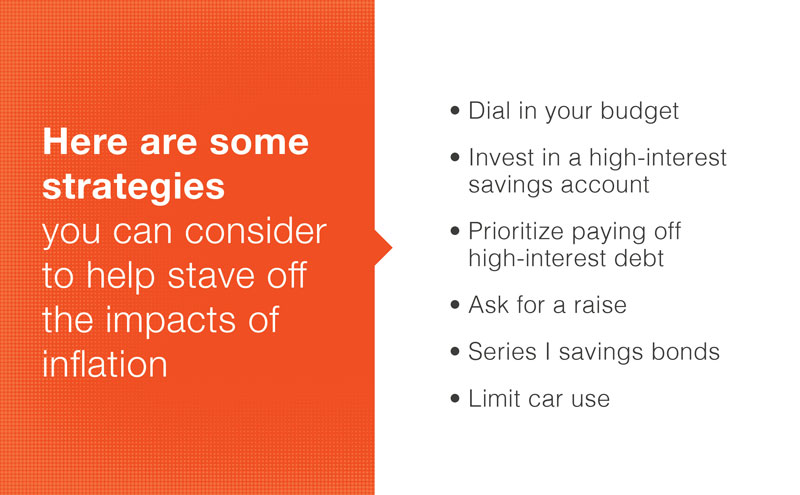Tips to fight the effects of inflation
Perhaps no topic has dominated news headlines in recent years as much as inflation. From the gas pump to the grocery checkout to housing costs, just about everything is noticeably more expensive now than just a few years ago.

Remember the early months of 2020? That’s when prices were last considered “normal,” as inflation was at near zero levels, according to the U.S. Bureau of Labor Statistics.
Inflation climbed to a peak in summer of 2022 when it surpassed 9 percent, meaning the average price of goods were more than 9 percent more expensive than 12 months prior. The inflation rate dropped down to around 3 percent a year after that, and it has hovered around that level into 2024.
While inflation has come down from its recent peak in the U.S., consumers are still navigating a more expensive economy and are potentially experiencing eroding savings accounts. Here are some strategies you can consider to help stave off the impacts of inflation:
- Dial in your budget - While keeping a budget is always beneficial, the stakes are even higher during periods of inflation. Taking a close look at your budget can help you identify areas where spending can be dialed back. Discretionary spending, such as unused streaming services subscriptions, can really add up.
- Invest in a high-interest savings account - Periods of high inflation are often paired with high interest rates set by the Federal Reserve, as the government tries to reign in spending to lower inflation. While high interest rates make it harder for you to borrow, a silver lining is that now is an opportune time to put money in a savings account that will earn you a higher yield. If you can afford to store away your extra cash, a high-interest certificate of deposit account might be a good option for you.
- Prioritize paying off high-interest debt - The other side of the high-interest coin is that outstanding debt in your name becomes more expensive to pay off. If you previously took out a variable interest loan, with rising rates, the more the debt will accrue because the interest and payments on the loan increase. For this reason, it should be a priority during this time to pay off as much of your debt as possible in a timely manner.
- Ask for a raise - If your wages haven’t increased on par with inflation rates, you’re effectively experiencing a pay cut. Inflation is a worthy reason to seek a raise from your employer that helps you keep pace with the rising cost of living. This concept is also known as a Cost of Living Adjustment (COLA), which is used by the Social Security Administration and other pension funds to account for inflation. Similar to seeking a raise, it’s also worth asking about assistance with transportation costs related to your work commute, such as mileage or public transit fare reimbursements to help offset high gas prices.
- Series I savings bonds - Administered by the U.S. Department of the Treasury, the interest rate on these bonds is adjusted every six months based on inflation. That means you earn a relatively high yield during inflationary periods. Series I bonds are generally considered a lower risk alternative to stock investments while still earning a competitive interest rate.
- Limit car use - Whether it’s your commute to work or your regular errands, gas and car maintenance expenses are no small thing. While going totally car-free isn’t practical for most people, consider ways to dial back your car use. This might include taking public transit, working from home, and doing all your errands during the same trip whenever possible.
There’s no doubt that periods of inflation are challenging to navigate. Times like these are as important as ever to dial in the best personal finance practices to help you stay ahead of inflation. Don’t hesitate to get in touch with our personal banking team today to discuss your financial goals and how we can help you achieve them.



